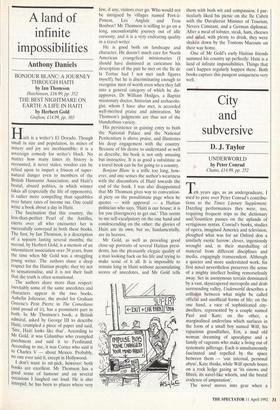A land of infinite impossibilities
Anthony Daniels
Haiti is a writer's El Dorado. Though small in size and population, its mines of misery and joy are inexhaustible; it is a sovereign comedy for writer's block. No matter how many times its history is recounted, it never stales; voodoo can be relied upon to impart a frisson of super- natural danger even to members of the British Humanist Association; and Haiti's brutal, absurd politics, in which winner takes all (especially the life of opponents), ig rather more compelling than squabbles over future rates of income tax. One could write a book about a day in Haiti.
The fascination that this country, the less-than-perfect Pearl of the Antilles, exerts over all who encounter her is successfully conveyed in both these books. The first, by Ian Thomson, is a description of a sojourn lasting several months; the second, by Herbert Gold, is a memoir of an intermittent association over 38 years, from the time when Mr Gold was a struggling Young writer. The authors share a deep respect for the Haitian people; they try not to sensationalise, and it is not their fault that the truth is often sensational.
. The authors share more than respect: Inevitably some of the same anecdotes and characters appear in the two books. Aubelin Jolicoeur, the model for Graham Greene's Petit Pierre in The Comedians (and proud of it), has a prominent part in both. In Mr Thomson's book, a British admiral, asked by George III to describe Haiti, crumpled a piece of paper and said, 'Sire, Haiti looks like that'. According to Mr Gold, it was Columbus who crumpled parchment and said it to Ferdinand. According to me, it was Cortes who said it to Charles V — about Mexico. Probably, no one ever said it, except in Hollywood.
I don't want to nit-pick, however: both books are excellent. Mr Thomson has a good sense of humour and on several ?ccasions I laughed out loud. He is also Intrepid; he has been to places where very few, if any, visitors ever go. Who would not be intrigued by villages named Port-a- Piment, Les Anglais and Trou Bonbon? Mr Thomson is willing to go on a long, uncomfortable journey out of idle curiosity, and it is a very endearing quality in a travel writer.
He is good both on landscape and character. He doesn't much care for North American evangelical missionaries (I should have dismissed as caricature his description of the pair he met on the Ile de la Tortue had I not met such figures myself), but he is discriminating enough to recognise men of worth even when they fall into a general category of which he dis- approves. Dr William Hodges, a Baptist missionary doctor, historian and archaeolo- gist, whom I have also met, is accorded well-merited praise and admiration. Mr Thomson's judgments are thus not of the blunderbuss variety.
His persistence in gaining entry to both the National Palace and the National Penitentiary is above praise, and illustrates his deep engagement with the country. Because of his desire to understand as well as describe, his book is not only amusing but instructive. It is as good a substitute as a travel book can be for going to a country.
Bonjour Blanc is a trifle too long, how- ever, and one senses the author's weariness with the discomforts of Haiti towards the end of the book. I was also disappointed that Mr Thomson gives way to convention- al piety on the penultimate page when he quotes — with approval — a Haitian politician who says, 'Haiti is our house; it is for you (foreigners) to get out.' This seems to me self-exculpatory on the one hand and condescending on the other: the glories of Haiti are its own, but so, fundamentally, are its horrors.
Mr Gold, as well as providing good close-up portraits of several Haitian presi- dents, has the pleasantly elegaic quality of a man looking back on his life and trying to make sense of it all. It is impossible to remain long in Haiti without accumulating scores of anecdotes, and Mr Gold tells them with both wit and compassion. I par- ticularly liked his picnic on the Ile Cabrit with the Duvalierist Minister of Tourism, Nevers Constant, and a German diplomat. After a meal of lobster, steak, ham, cheeses and salad, with plenty to drink, they were shaken down by the Tontons Macoute on their way home.
One of Mr Gold's early Haitian friends summed his country up perfectly: Haiti is a land of infinite impossibilities. Things that can't happen regularly happen there. Both books capture this pungent uniqueness very well.


















































 Previous page
Previous page